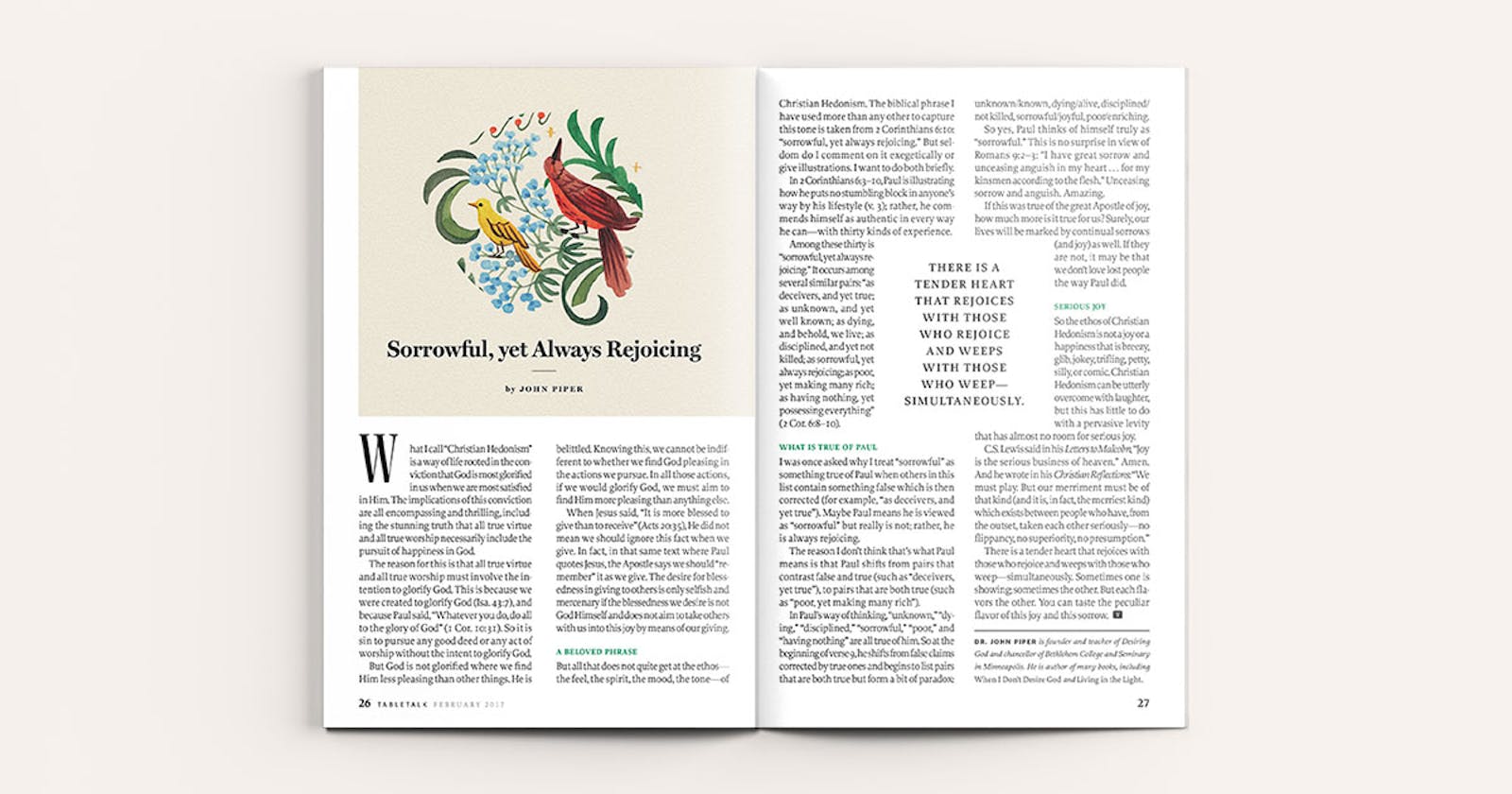
Request your free, three-month trial to Tabletalk magazine. You’ll receive the print issue monthly and gain immediate digital access to decades of archives. This trial is risk-free. No credit card required.
Try Tabletalk NowAlready receive Tabletalk magazine every month?
Verify your email address to gain unlimited access.
What I call “Christian Hedonism” is a way of life rooted in the conviction that God is most glorified in us when we are most satisfied in Him. The implications of this conviction are all-encompassing and thrilling, including the stunning truth that all true virtue and all true worship necessarily include the pursuit of happiness in God.
The reason for this is that all true virtue and all true worship must involve the intention to glorify God. This is because we were created to glorify God (Isa. 43:7), and because Paul said, “Whatever you do, do all to the glory of God” (1 Cor. 10:31). So it is sin to pursue any good deed or any act of worship without the intent to glorify God.
But God is not glorified where we find Him less pleasing than other things. He is belittled. Knowing this, we cannot be indifferent to whether we find God pleasing in the actions we pursue. In all those actions, if we would glorify God, we must aim to find Him more pleasing than anything else.
When Jesus said, “It is more blessed to give than to receive” (Acts 20:35), He did not mean we should ignore this fact when we give. In fact, in that same text where Paul quotes Jesus, the Apostle says we should “remember” it as we give. The desire for blessedness in giving to others is only selfish and mercenary if the blessedness we desire is not God Himself and does not aim to take others with us into this joy by means of our giving.
A Beloved Phrase
But all that does not quite get at the ethos—the feel, the spirit, the mood, the tone—of Christian Hedonism. The biblical phrase I have used more than any other to capture this tone is taken from 2 Corinthians 6:10: “sorrowful, yet always rejoicing.” But seldom do I comment on it exegetically or give illustrations. I want to do both briefly.
In 2 Corinthians 6:3–10, Paul is illustrating how he puts no stumbling block in anyone’s way by his lifestyle (v. 3); rather, he commends himself as authentic in every way he can—with thirty kinds of experience.
Among these thirty is “sorrowful, yet always rejoicing.” It occurs among several similar pairs: “as deceivers, and yet true; as unknown, and yet well known; as dying, and behold, we live; as disciplined, and yet not killed; as sorrowful, yet always rejoicing; as poor, yet making many rich; as having nothing, yet possessing everything” (2 Cor. 6:8–10).
What Is True of Paul
I was once asked why I treat “sorrowful” as something true of Paul when others in this list contain something false which is then corrected (for example, “as deceivers, and yet true”). Maybe Paul means he is viewed as “sorrowful” but really is not; rather, he is always rejoicing.
The reason I don’t think that’s what Paul means is that Paul shifts from pairs that contrast false and true (such as “deceivers, yet true”), to pairs that are both true (such as “poor, yet making many rich”).
In Paul’s way of thinking, “unknown,” “dying,” “disciplined,” “sorrowful,” “poor,” and “having nothing” are all true of him. So at the beginning of verse 9, he shifts from false claims corrected by true ones and begins to list pairs that are both true but form a bit of paradox: unknown/known, dying/alive, disciplined/not killed, sorrowful/joyful, poor/enriching.
So yes, Paul thinks of himself truly as “sorrowful.” This is no surprise in view of Romans 9:2–3: “I have great sorrow and unceasing anguish in my heart . . . for my kinsmen according to the flesh.” Unceasing sorrow and anguish. Amazing.
If this was true of the great Apostle of joy, how much more is it true for us? Surely, our lives will be marked by continual sorrows (and joy) as well. If they are not, it may be that we don’t love lost people the way Paul did.

Serious Joy
So the ethos of Christian Hedonism is not a joy or a happiness that is breezy, glib, jokey, trifling, petty, silly, or comic. Christian Hedonism can be utterly overcome with laughter, but this has little to do with a pervasive levity that has almost no room for serious joy.
C.S. Lewis said in his Letters to Malcolm, “Joy is the serious business of heaven.” Amen. And he wrote in his Christian Reflections: “We must play. But our merriment must be of that kind (and it is, in fact, the merriest kind) which exists between people who have, from the outset, taken each other seriously—no ippancy, no superiority, no presumption.”
There is a tender heart that rejoices with those who rejoice and weeps with those who weep—simultaneously. Sometimes one is showing; sometimes the other. But each flavors the other. You can taste the peculiar flavor of this joy and this sorrow.
